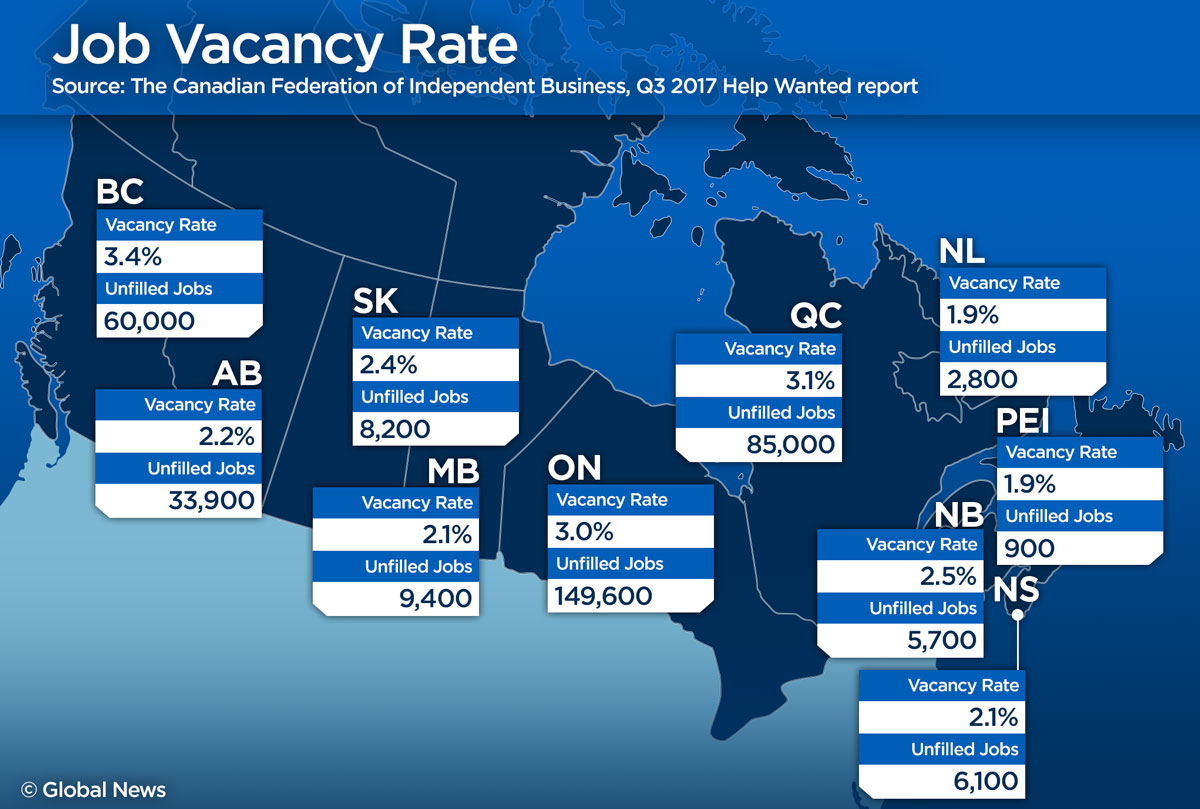There’s a labour shortage in Canada — and British Columbia seems to be the province most in need of skilled workers, according to a recent report.

A combination of a growing economy and a lack of skilled workers has created a labour shortage of around 361,700 jobs across the country, according to the quarterly report by the Canadian Federation of Independent Business (CFIB).
This is the highest number of unfulfilled jobs in the private sector every recorded in Canada, the report stated.
WATCH: Critical labour shortage for Vancouver businesses

“Labour shortages are again becoming a major hindrance to businesses across the country, especially small firms,” Ted Mallett, chief economist at CFIB said. “We need government to take action, to find solutions for chronic shortages that inhibit a small business’ ability to take on new contracts, expand and innovate.”
Avery Shenfeld, chief economist of CIBC said although this is an independent study, it does seem possible that there is a growing job shortage in Canada.
“That does go hand-in-hand with full employment,” he said. “We’re seeding the same in the U.S. Employers who have undesirable jobs can find themselves unable to fill positions.”
- More than half of small businesses say U.S. no longer reliable: CFIB data
- The Bank of Canada says these are the 3 warning signs for mortgage default
- Carney says Canadian military participation in Middle East war can’t be ruled out
- ‘Buy Canadian’ policy likely to cost taxpayers $12 billion yearly: study
Where are the job vacancies?
Businesses in three provinces are experiencing the brunt of the shortages, according to the report. British Columbia has the highest job vacancy rate (3.4 per cent) followed by Quebec (3.1 per cent) and Ontario (3.0 per cent).
Industries with largest job vacancies

Get breaking National news
The report said the industries experiencing the biggest labour shortages are:
- Retail (50,000 jobs)
- Hospitality (45,900 jobs)
- Construction (38,000 jobs)
Feeling the shortage
Solly’s Bagels, a popular cafe in Vancouver, had to temporarily close one of its locations in September due to staff shortages, owner Leah Markovitch, said.
“It’s the worst point we’ve ever been at short labour in Vancouver. What I call it, is a perfect storm,” Markovitch told CKNW.
“We’re running on two people and we are not able to be critical of the quality of our workers because those are the only workers we have. The customers complain, but I can’t do any better,” Markovitch said.
Markovitch cited affordability costs, fewer people interested in kitchen work and a lack of foreign workers as reasons for the shortage.
Markovitch said Solly’s pays a living wage of $15 an hour and after a month of training, it increases to $18 an hour.
LISTEN: Why are so many businesses experiencing labour shortages?
Lower expectactions?
There are a number of reasons for the shortages, such as the hours the job offers, the wage and the skill set needed, the CFIB said.
Employers may have to start compromising on skill set, Mallett said.
“An employer hoping for a candidate that perfectly meets the objective with the skill set and salary, may not be able to find that person,” he said. “If a job isn’t getting filled, an employer may need to change the skill set for the type of business.”
Shenfeld said employers may also have to start offering more money.
WATCH: Ontario premier announces minimum wage to rise to $15 an hour

“These are relatively low paying positions, so workers could be looking elsewhere,” he said.
“Workers’ bargaining power is starting to improve,” he said. Employers may have to start offering more money in order to compete for the higher skilled workers, he added.
So provinces like Ontario, which is increasing the minimum wage to $15 an hour, may look more attractive to an employee, Shenfeld said.









Comments
Want to discuss? Please read our Commenting Policy first.